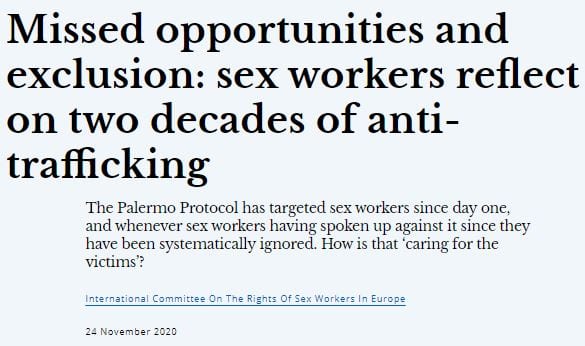
Missed opportunities and exclusion: sex workers reflect on two decades of anti-trafficking
For anyone interested in the rights of sex workers, the twentieth anniversary of the Palermo Protocol is an unmissable chance to evaluate how sex workers have been impacted by anti-trafficking rhetoric and policy. Whatever opportunities Palermo might have initially presented, it is now inextricably aligned with harmful ideological agendas that sex workers are obliged to resist and reject.
For decades now, sex workers in Europe have been combatting calls to ‘abolish prostitution’. These have gained prominence via the conflation of trafficking and sex work. Researchers have repeatedly demonstrated that this conflation is flawed, yet it continues to be championed by opponents of the ‘sex work is work’ approach.
At the heart of this dispute is the so-called Swedish Model. Born one year before the Palermo Protocol, this policy criminalises the clients of sex workers in order to end demand for sex work and, its proponents would believe, for trafficked women. Despite its many flaws, this model has now been adopted in Norway, Ireland, France, Northern Ireland, Israel, and Canada. Other countries are currently debating whether to adopt it as well.
Meanwhile, both the protocol’s and the Swedish Model’s overwhelming focus on criminal justice has channelled immense resources into the investigation and prosecution of traffickers, as well as into programmes designed to prohibit prostitution in all but name.
Criminalisation that harms
Despite political rhetoric framing anti-trafficking work as grounded in human rights, punitive approaches remain dominant. To a large extent, anti-trafficking has come to mean the criminalisation of users of services and goods produced by victims. Thanks to the blanket conflation of sex work and trafficking, combating trafficking for sexual exploitation has thus translated into criminalising the users (clients) of all sex workers.
The vulnerabilities brought on by the criminalisation of demand have been exacerbated by the criminalisation of facilitating sex work. This is often assumed to be a provision against abusive pimps, but under repressive prostitution and anti-trafficking regimes it goes much further. Any third-party facilitation of prostitution risks arrest and prosecution, and no distinction is drawn between abusive employers and groups of sex workers working together for safety. Thanks to laws such as FOSTA/SESTA in the United States, third party criminalisation has extended into the digital realm, with websites, applications, and online advertising platforms being shut down for facilitating prostitution and/or trafficking.
Read more here.
